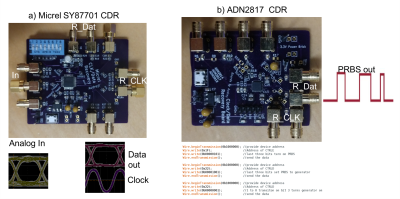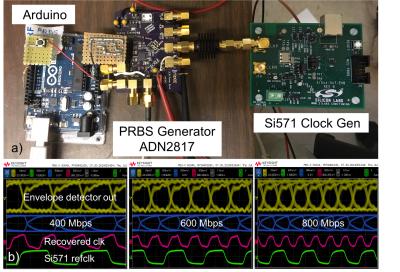Audrey Chan1, Fraser Robb2, John Pauly3, Shreyas Vasanawala4, and Greig Cameron Scott5
1Victoria University of Wellington, Wellington, New Zealand, 2GE Healthcare, Aurora, OH, United States, 3Stanford University, Stanford, CA, United States, 4Radiology, Stanford University, Stanford, CA, United States, 5Electrical Engineering, Stanford University, Stanford, CA, United States
1Victoria University of Wellington, Wellington, New Zealand, 2GE Healthcare, Aurora, OH, United States, 3Stanford University, Stanford, CA, United States, 4Radiology, Stanford University, Stanford, CA, United States, 5Electrical Engineering, Stanford University, Stanford, CA, United States
A test system is prototyped to perform pseudo-random binary sequence (PRBS) generation and clock/data recovery to assess high speed serial link performance of wireless and optical signal integrity for MRI data interfacing.

Figure 1: Clock and Data Recovery board prototypes. a) Micrel SY87701 can perform clock & data recovery from 28Mbps to 1.3Gbps, but requires a reference clock. b) Analog Devices ADN2817 operates from 10Mbps to 2.7Gbps, integrates a front end limiting amplifier for small signals, and has a programmable pseudo-random binary sequence (PRBS) generator.

Figure 2: a) PRBS generator uses an Arduino module to configure the ADN2817 CDR device as a PRBS generator. The clock is provided by an SiLabs Si571 programmable clock generator eval board. b) Demonstration of PRBS generation from 400-800 Mbps to a 3.2GHz amplitude shifted keyed modulator and direct detection by an ADL6012 envelope detector. The detector output is yellow, and clock/data (pink/blue) is recovered by the SY87701. The Si571 clock reference is the green trace.
